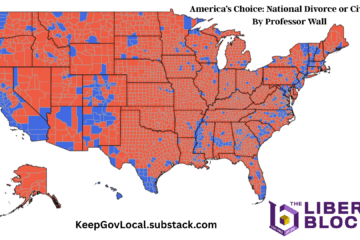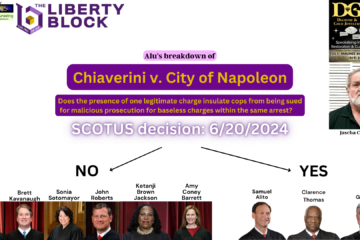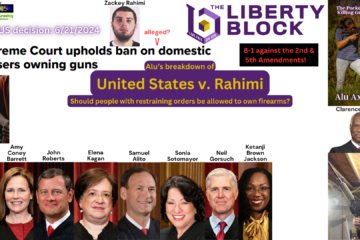By Dan Behrman For The Liberty Block
The war on drugs has been a complete failure, and many are understandably upset about it. For decades, states have been legalizing the use of cannabis for medicinal purposes, starting with California in 1996. More recently, some states have started allowing it even for recreational purposes, starting with Colorado in 2012. The states that are legalizing its use are implementing very high taxes for the privilege of purchasing from a state-sanctioned provider as opposed to a ‘black market’ drug dealer. The results have been that these states have raised enormous amounts of revenue, and many advocates for the legalization of cannabis are now using this outcome to drive other states to legalize cannabis as well.
Is this a good approach?
We understand that there are certain obvious crimes. Stealing and killing are two of the major ones. Kidnapping is less common but is certainly heinous. These are not illegal because the government says so, the government simply defines the penalties for these crimes. They are illegal, or criminal, because they cause harm to others. Before our laws were written, there was a common law which was a process to discover what was a crime by a thorough evaluation of the circumstances and morality.

We have to consider that legislated law doesn’t really determine morality or what is right or wrong. In some cases, it attempts to prescribe particular scenarios that might not ordinarily be recognized as a true-crime in order to make it easier to prosecute. In other cases, it merely defines what the government’s agents can do if a person is found guilty of a particular action, regardless of morality. It is important to understand that the government can list anything and impose fines and criminal penalties on things that are not even criminal in nature, such as possession or consumption of cannabis where there is no real victim.
If you were selected for a jury, you would know that a person accused of murder, theft or kidnapping was guilty solely by his actions. You wouldn’t have to be told that there was a law, and you wouldn’t have to be shown any statute to decide to give a guilty verdict. However, the opposite is always a possibility. You might see something that looks like one of those crimes, but you might be told that there is a statute making it legal. Kidnapping is taking someone by force to another place, typically to be held ransom. We allow the government to do a very similar act against people who have committed crimes, but we don’t call that kidnapping, we call it an arrest. But what if no crime was committed prior to the arrest? Is this kidnapping? Many argue that it is.
Today, in many states, if you are found in possession of cannabis, you will be taken against your will. The public perception will be that you committed a crime, but only because legislators have declared this to be the case. If you don’t consider possession of cannabis to be a crime, then it would appear that the abduction was not just, and was, in fact, kidnapping. When a state legalizes cannabis and ceases to arrest people for possession, we see that they are realizing this is not a crime and never was. They might recognize that it is not immoral and never was. They are declaring that they will no longer impose penalties for people committing the act. This abrupt reversal in policy means that even the government has acknowledged that they have long been kidnapping people and/or destroying their lives for an act that is not really a crime! As Joe Rogan says, “Prison is for rapists, thieves, and murderers. If you lock someone up for smoking a plant that makes them happy, then you’re the f***ng criminal.
If someone were to take someone by force for something that was not a crime, we would consider that kidnapping. Now that we understand that possession of cannabis was never a crime, we can see that the government was in fact kidnapping. I’m not suggesting this to point blame at any officers, prosecutors or judges involved. This is a bigger societal problem created by a handful of politicians in the Nixon era, some with criminal intent, who should receive the real blame.
With all of this understanding, we can look back at the argument that if we legalize cannabis, states would raise money from the taxes imposed on the sale. If we understand that this is not a crime, and the current system kidnaps people over this, then suggesting we pay them instead of kidnapping is quite literally stating that a person should pay the ransom to avoid being kidnapped in the first place. And what happens if you don’t pay this ransom? Someone purchasing or selling on the black market might be kidnapped and forced to pay a fine or be punished in another way. This is, again, ransom.
Why can’t we just try freedom instead of trying to control the behavior of others who may do things we don’t want in our own lives but do not interfere with our own lives?
You can learn more about my campaign for President of the United States at Behrman2020.com.


